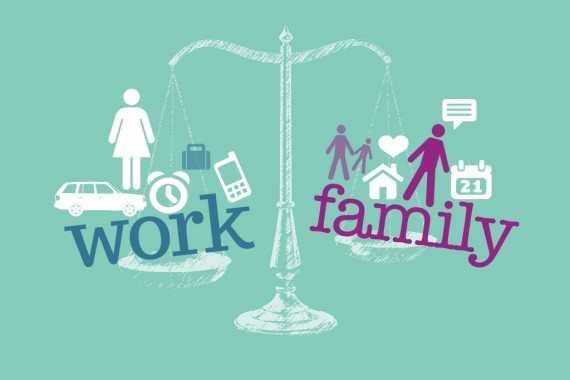National Work and Family Month

The struggle to balance your role as a career driven individual and your role as a caring family member can feel daunting and stressful. In the attempt to alleviate some of that stress, the US Senate designated October as National Work and Family Month in 2003. This month, employers are asked to create healthier and more flexible work environments that encourage balance, and employees are inspired to find ways to balance their professional lives and time spent with family.
I know what you are thinking. Easier said than done, right?
If you are feeling like your life is out of balance, try the following in honor of National Work and Family Month.
Forward Thinking
As opportunities to advance and new responsibilities arise, be forward thinking in your career. Fully consider how much time will be spent away from family before you accept new challenges at work, and discuss your options with your family before agreeing to any career moves that will impact them. Some questions that you may want to consider include:
- What will I be missing out on at home?
- Am I willing to stretch my already tight schedule to accommodate more work?
- Is the workload sustainable over time?
Be forward thinking and intentional in your career so that you do not upset the balance between work and family by taking on too much.
Unplugging
The importance of unplugging cannot be stressed enough if you are trying to find balance between your personal life and professional life. A recent Gallup survey found that 21% of employees check work related emails during non-work hours, and respond despite being off the clock. In addition, 11% of workers believe that the amount of emails they receive, and feel required to respond to during their time away from the office, is unreasonable. If work calls, emails, and texts are hindering your ability to enjoy time with family, discuss boundaries with your manager and team members. Having this conversation will help you to enjoy your time off, and help curb any resentment over the amount of emails you are receiving and responding to while at home.
Planning Ahead
With 38% of employees having missed life events due to poor balance between their work life and their personal life (Workfront), it is evident that planning ahead is a crucial element in creating balance. Fortunately, it is possible to avoid a majority of work/family overlap by organizing important meetings, birthdays, trips, etc. on a calendar that clearly displays both work and family related activities. Better yet, use a calendar app that shares your schedule with family members so that everyone is on the same page. Doing this will help you to avoid missing a dance recital, soccer game or family dinner because you are stuck at a work dinner.
Being Present
Whether at work or at home, be present in whichever situation you find yourself in. This means that in addition to avoiding personal business at work (whenever possible), you should also dedicate your time at home to your family (not catching up on work). Just as your employer will be more willing to excuse you early for a family event if you are typically attentive to your job during work hours, family members will be more understanding of the nights that you need to work late if you are fully engaged while at home.
Communicating
As cliché as it sounds, communication is key. Without communication, it is impossible to strike the right balance between work and family. Don’t be afraid to voice your time restrictions, limitations, and expectations to your employer, coworkers, and family members. Involving those that you trust in both the workplace and at home will help you to feel more confident in how you are spending your time.
A true balance between work and family is difficult to achieve, and can even be impossible at times. However, these methods of finding balance are worth some consideration during National Work and Family Month.

